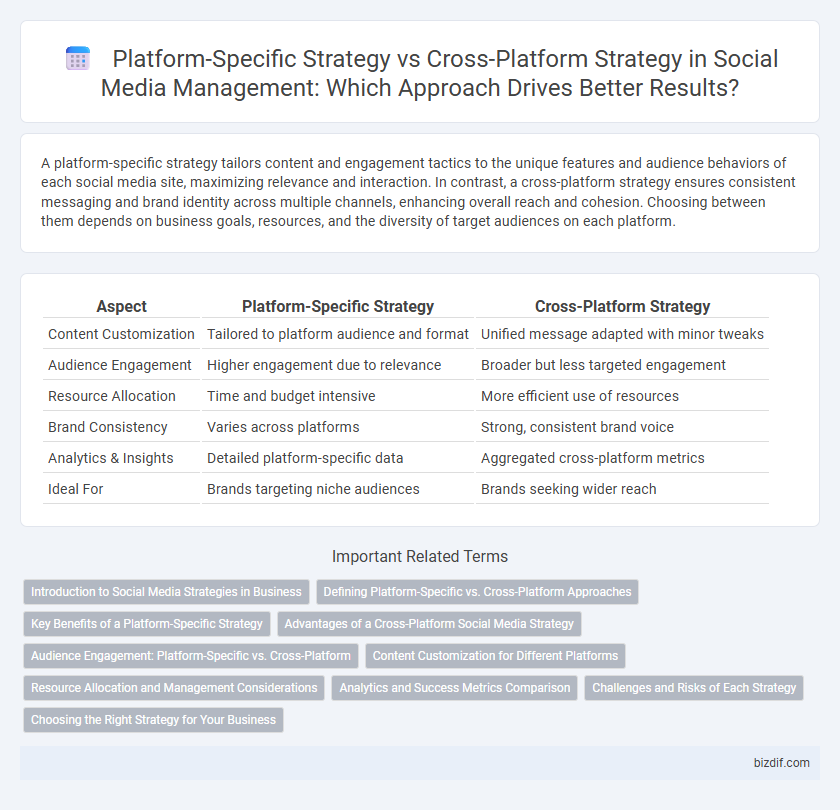A platform-specific strategy tailors content and engagement tactics to the unique features and audience behaviors of each social media site, maximizing relevance and interaction. In contrast, a cross-platform strategy ensures consistent messaging and brand identity across multiple channels, enhancing overall reach and cohesion. Choosing between them depends on business goals, resources, and the diversity of target audiences on each platform.
Table of Comparison
| Aspect | Platform-Specific Strategy | Cross-Platform Strategy |
|---|---|---|
| Content Customization | Tailored to platform audience and format | Unified message adapted with minor tweaks |
| Audience Engagement | Higher engagement due to relevance | Broader but less targeted engagement |
| Resource Allocation | Time and budget intensive | More efficient use of resources |
| Brand Consistency | Varies across platforms | Strong, consistent brand voice |
| Analytics & Insights | Detailed platform-specific data | Aggregated cross-platform metrics |
| Ideal For | Brands targeting niche audiences | Brands seeking wider reach |
Introduction to Social Media Strategies in Business
A platform-specific strategy tailors content and engagement techniques to the unique features and audience behaviors of each social media channel, enhancing relevance and maximizing reach. Cross-platform strategy emphasizes consistent branding and messaging across multiple channels to build cohesive brand identity and broaden audience engagement. Combining both approaches enables businesses to leverage individual platform strengths while maintaining unified communication, optimizing overall social media performance.
Defining Platform-Specific vs. Cross-Platform Approaches
Defining platform-specific strategies involves tailoring content and engagement tactics to the unique features and audience behaviors of each social media channel, such as Instagram's visual-driven posts or LinkedIn's professional networking tone. Cross-platform strategies emphasize creating unified messaging and brand consistency across multiple channels, ensuring seamless user experience and broader reach. Effective social media management balances these approaches by leveraging platform-specific strengths while maintaining cohesive brand identity across platforms.
Key Benefits of a Platform-Specific Strategy
A platform-specific strategy enables brands to tailor content and engagement tactics to the unique algorithms, demographics, and features of each social media site, enhancing relevance and user interaction. This targeted approach drives higher engagement rates, improved audience insights, and maximizes the effectiveness of paid advertising by aligning with platform-specific behaviors. Focusing on individual platforms allows for optimized content formats and messaging, increasing brand loyalty and conversion potential within distinct communities.
Advantages of a Cross-Platform Social Media Strategy
A cross-platform social media strategy amplifies brand reach by engaging diverse audiences across multiple channels, enhancing visibility and interaction rates. It enables cohesive messaging tailored to platform-specific behaviors while leveraging data insights collectively for improved targeting and content optimization. Consistent presence across platforms fosters stronger brand recognition and drives higher conversion by capturing users at various touchpoints in their digital journey.
Audience Engagement: Platform-Specific vs. Cross-Platform
Platform-specific strategies tailor content to the unique preferences and behaviors of each social media audience, maximizing engagement through customized messaging and format optimization. Cross-platform strategies create a unified brand presence, fostering broader reach and consistent interaction but may sacrifice deep engagement on individual platforms. Balancing these approaches leverages data analytics to target demographics effectively while maintaining cohesive brand storytelling for optimal audience engagement.
Content Customization for Different Platforms
Content customization for different platforms enhances audience engagement by tailoring formats, tone, and messaging to fit each platform's unique user behavior and technical specifications. A platform-specific strategy leverages distinct features like Instagram's visual-centric posts or Twitter's concise updates, maximizing relevance and impact. Cross-platform strategies integrate consistent branding while adjusting content structure to optimize reach and interaction on diverse channels such as Facebook, LinkedIn, and TikTok.
Resource Allocation and Management Considerations
Resource allocation in social media management demands a tailored approach where platform-specific strategies optimize content relevance, engagement, and advertising budgets, capitalizing on unique audience behaviors and algorithmic nuances. Cross-platform strategies require coordinated management to maintain brand consistency and efficient use of resources, leveraging unified analytics tools and scheduling software to streamline workflow across channels like Instagram, Facebook, Twitter, and LinkedIn. Balancing these approaches enhances ROI by directing manpower and budget towards platforms with the highest conversion rates while preserving a coherent brand presence.
Analytics and Success Metrics Comparison
Platform-specific strategies leverage tailored analytics to optimize content performance based on unique audience behavior and engagement patterns on each social media channel. Cross-platform strategies rely on aggregated success metrics such as overall reach, conversion rates, and brand sentiment to provide a holistic view of marketing effectiveness across multiple networks. Analyzing platform-specific data alongside unified performance indicators enables precise campaign adjustments and maximizes ROI in social media management.
Challenges and Risks of Each Strategy
Platform-specific strategies in social media management face challenges such as resource intensiveness and the risk of inconsistent brand messaging across diverse channels. Cross-platform strategies often struggle with diluted content effectiveness and difficulties in tailoring messages to distinct audience behaviors, increasing the risk of lower engagement rates. Both approaches require careful balance to mitigate risks like audience fragmentation and diminished return on investment.
Choosing the Right Strategy for Your Business
Choosing the right social media strategy depends on your business goals and target audience. Platform-specific strategies allow for tailored content and engagement on each channel, maximizing relevance and effectiveness. Cross-platform strategies enable brand consistency and broader reach but require cohesive messaging to avoid audience confusion.
platform-specific strategy vs cross-platform strategy Infographic

 bizdif.com
bizdif.com